'Perfect explosive mixture' was flagged years before fatal water plant blast
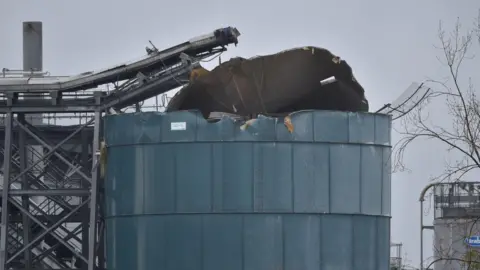 Press Association
Press AssociationIt has been more than four years since an explosion at a water treatment plant killed four workers, including a 16-year-old apprentice. No official explanation has yet been published.
Now a BBC West investigation has uncovered reports which expressed serious concerns about conditions in parts of the site, long before the incident.
"If these reports are even half correct, then this was an accident waiting to happen," an industry expert said.
Under the agreement of anonymity, he has studied two leaked reports provided to the BBC about safety at the Wessex Water Avonmouth plant near Bristol.
They were written for and provided to the company five years before a storage tank explosion killed Michael James, 64, Brian Vickery, 63, Raymond White, 57, and Luke Wheaton, 16, in December 2020.
The reports highlight a "perfect explosive mixture", "serious risk to personnel" and a smell of gas so strong, the authors claimed they could not stay in the area to complete their report.
Wessex Water said it has "robust process controls on site" and the matters identified by the reports - produced nearly 11 years ago - "have been resolved". It added that the reports relate to a different part of the site from where the explosion occurred.
 Avon and Somerset Police
Avon and Somerset PoliceThe site processes waste water, sifting out solids, and produces biogas and a form of fertiliser.
The reports, written by a consultant brought in to assess the site in 2014 and 2015, warned Wessex Water about safety concerns across parts of the plant, including digesters, gas holders and biogas pipework.
Both reports explicitly flagged an explosion risk.
The author – who also spoke to the BBC on the agreement he would not be named - said he wanted to make his findings public because he had twice tried to contact the Health and Safety Executive (HSE) but had not had any reply.
"I think it [the explosion] could have been prevented," he said.
The areas of the plant covered by the reports are separate from the storage silo that exploded in 2020, but the reports' author, an experienced consultant in the anaerobic digestion industry, said he had been concerned about large parts of the site.
"From the start of the plant all the way through to the holding tank, the complete biogas system was dangerous," he said.
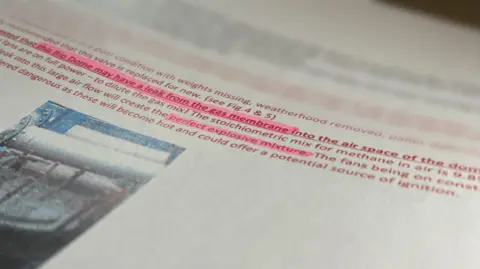
An investigation by Avon and Somerset Police was dropped in July 2024. A spokesperson at the time said the evidence gathered did not reach the "extremely high threshold to prosecute" for manslaughter.
Meanwhile, families and colleagues continue to wait for answers as the HSE has yet to release its findings, which are unlikely to come before July this year, but which could still result in criminal charges.
Coming forward to BBC West's investigations team, the reports' author said that following his inspections in 2014 and 2015 he would not have been happy for one of his family members to work there.
"Four years on, I thought... there would be some sort of closure for the families," he said.
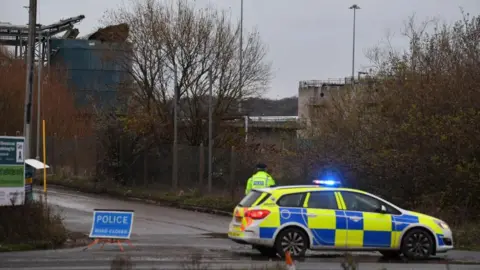
The reports are highly technical and raised a number of safety issues in 2014 and 2015. The claims include:
- A bio dome with a gas leak, meaning a fan had to be switched on constantly, creating a "perfect explosive mixture" with the fan being a potential source of ignition
- A powerful smell of gas around the roofs of digestion tanks, so strong the authors said they could not stay in the area to complete their report
- Corroded pressure valves and bird screens, along with some valves that are "greatly undersized"
- Gas possibly flowing the wrong way around the site because of inadequate measuring tools
Another concern was the alleged emission of hydrogen sulphide (H₂S), which the report described as a "serious risk to personnel". H₂S is a toxic gas that, in high concentrations, can be lethal.
The author said: "It wasn't just the explosive atmosphere, it was the toxic atmosphere created by the valves venting.
"Any gas discharge will create a hazardous environment or potentially a hazardous environment."
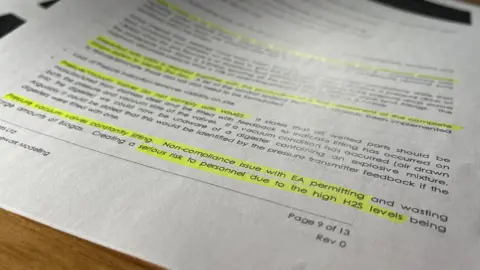
The reports also state that none of the vessels they looked at were fitted with flame arresters – safety devices designed to stop flames from igniting flammable gases.
While some industry experts consider these essential, others believe they are not always necessary and there is no legal obligation to fit them.
The reports' author said: "I think all the digesters should have flame arresters.
"The industry seems to oppose it, but flame arresters... would have prevented a spark being taken back into the vessel and causing a large explosion."
The BBC has not been able to establish whether Wessex Water took remedial action between these warnings in 2015 and the explosion in 2020. It is not clear whether the silo that exploded was fitted with a flame arrester at any point.
In January 2024 - three years after the explosion - the Health and Safety Executive served the company with an Improvement Notice.
It said: "The operator has failed to demonstrate... that it has taken all measures necessary to prevent major accidents and limit their consequences.
"Their Major Accident Prevention Policy does not address the necessary measures and major hazards management system elements required."
In response, Wessex Water said the notice was "unrelated to the subject matter of the reports" and that the HSE was "satisfied" with steps taken by the company and confirmed compliance on 9 February 2024.
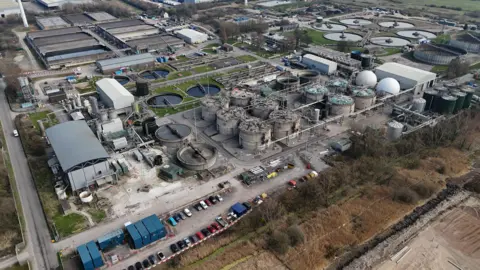
The author of the reports confirmed his findings were shared with management at Wessex Water in 2014/15 and said he believed that the issues were a systemic failure, rather than the fault of staff on the ground.
"I think they didn't do the correct assessment... on the complete system from start to finish," he said.
He believes high levels of gas were produced in the holding tank that exploded, which may have been ignited by a spark on the day of the incident.
Many industry figures and Wessex Water staff have been reluctant to comment publicly for fear of jeopardising future work in an industry with few employers.
One, who studied the reports but spoke on condition of anonymity, said: "I'm looking at this thinking I wouldn't want to operate this plant. There are too many things wrong.
"The number of places they're venting gas from is scary. If these reports are even half correct, then this was an accident waiting to happen."
'Wrong standard'
Another source, who knows the Avonmouth site well, said safety problems in the industry were widely known before the explosion.
He said: "It feels like the whole water industry was working to the wrong standard.
"We always thought it would be one of the other water companies [where there would be a disaster] but it was Avonmouth."
He added that safety had improved dramatically in the years following the fatal blast.
The Health and Safety Executive said it could not comment on the BBC's findings because its investigation remained "live".

The exact cause of the explosion has not yet been made public.
But Prof Clifford Jones, a specialist in combustion risk at the University of Chester, said dust released from the storage silo could have been ignited by a spark.
He said: "There might have been an area at the top of the silo of high concentration of dust. That would have been susceptible to a spark.
"Methane which was there would make [the explosion] all the more powerful."
For the families of those who lost their lives, the community in Avonmouth and the water industry more broadly, the wait for answers will hopefully come to an end when the HSE publishes its investigation later this year.
If you want to contact us regarding this story, email [email protected]
Follow BBC West on Facebook, X and Instagram. Send your story ideas via WhatsApp on 0800 313 4630.
